- Home
- Lissa Evans
Wed Wabbit Page 2
Wed Wabbit Read online
Page 2
You’d be wrong.
Her cousin lived in the kind of house that Fidge would have liked to live in: one completely surrounded by a garden, with an orchard and a pond. Not that Graham ever played outside. The house had five bedrooms, one of which was right in the attic, with a round window that overlooked the garden – if you put a telescope in there, you’d be able see for miles. Not that Graham had actually picked that bedroom.
As Fidge got out of her uncle’s car, she saw a pale smudge looking out at her from one of the ground floor windows; it disappeared quickly as she approached.
Auntie Ruth met them at the back door, all wobbly-voiced with shock. ‘How dreadful,’ she kept saying, hugging Fidge and blinking back the tears. ‘What a dreadful accident, poor, poor little Minnie.’
‘Does Graham know yet?’ asked Uncle Simon in a hushed voice.
Fidge’s aunt nodded. ‘He heard you driving off and he wanted to know what was happening. And when I told him, he was completely silent for a moment and then he asked, “Does she have to stay here?”’ She smiled kindly over at Fidge. ‘He’s so sensitive to other people’s feelings, you see – he knew that you wouldn’t want to be away from your mother and Minnie. And then he couldn’t settle afterwards, he was worried he’d have bad dreams about road accidents. I phoned his therapist and she said to try the meditation technique, so we visualized a grove of palm trees swaying in the wind, but he said that that made him think of tsunamis …’
The discussion continued, and Fidge sat down at the kitchen table and realized that she was incredibly hungry. She buttered and ate a slice of bread, followed by two more, and then she laid her head on her hands and went to sleep.
She woke up in a bed, and opened her eyes to see a pair of half-open curtains, and between them a sky the ominous colour of milky cocoa. Her head ached, as though a brick was resting on top of it, her teeth felt furry and she was wearing pyjamas that she’d never seen before. For a second she didn’t know where she was, and then the whole dismal truth flooded through her, like a river bursting its banks, and floating on top of all the misery was a single shameful thought:
If it wasn’t for Minnie, we’d be going on holiday today.
She sat up quickly, but she couldn’t unthink the thought, and as she dressed herself in yesterday’s clothes and hurried down the stairs, it kept bobbing around in her head.
‘Oh, Fidge,’ said Auntie Ruth, walking through the hall with a tray in her hands, ‘your mother rang a while ago, but she said not to wake you – she’ll call again very soon.’
‘But how’s Minnie?’
‘Just about the same,’ said Auntie Ruth, trying (and failing) to make it sound as if that were good news.
‘Oh.’
Fidge stood on the stairs, without any particular reason to carry on down, or to go back up. The fact that she was neat and organized and available for emergencies was of no use to her now. She could tie knots, read instructions, scale a climbing wall, count to a hundred in Spanish and swim nearly two widths underwater, but none of this would help Minnie; there was nothing that she could do, apart from wish that yesterday had never happened.
‘I’m just bringing Graham his mid-morning ice cream,’ said Auntie Ruth, still holding the tray. ‘He’s halfway through a geography lesson. Why don’t you join him, and I’ll get you some breakfast?’
And though she didn’t want to join Graham, or do geography, or eat breakfast, Fidge could think of no alternative but to unglue her feet and follow her aunt.
FOUR
Auntie Ruth knocked tentatively on Graham’s door. From behind it came a high-pitched buzzing noise that seemed to vary in volume.
After a moment or two, footsteps approached and the door was opened by a tired-looking young woman.
‘Graham’s just circling Lima airport,’ she said. ‘Apparently there’s heavy cloud cover.’
A tiny model aircraft appeared briefly above her head and then zoomed away again. It crossed the enormous room, dipping down over the sofas, skimming the metre-wide computer screen, looping the loop over the bed in the shape of a racing car and finally circling the gigantic table over by the windows. Instead of a table cloth it was covered by a map of South America. The plane came steeply into land, hit the table top too hard, somersaulted off the end, and crashed into a cupboard door, snapping off both wings.
‘The runway needs re-surfacing,’ said Graham, dropping the remote control and picking up a small orange toy, which he immediately started fiddling with. ‘My approach was perfect.’
‘Do you remember how we learn?’ asked the young woman, in the sort of bright voice that people normally use on toddlers. ‘We learn from our mistakes! And in any case that wasn’t Lima, that was Rio de Janeiro.’
‘I didn’t have enough fuel to get to Lima,’ said Graham, picking up his spoon and prising a chocolate chip from the mound of ice cream in his bowl. He was large and pale, like a plant that has been heavily watered, but kept in the dark.
‘This is Graham’s cousin, Fidge,’ said Auntie Ruth to the young woman, ‘and Fidge, this is Alison, Graham’s home tutor.’
‘I was so sorry to hear about your sister’s accident,’ said Alison, gently.
Fidge, who couldn’t face talking about it, nodded tightly and looked out of the window. The sky had darkened to a nasty pinkish brown and there was a faint flickering along the horizon.
‘Come and sit with us,’ said Alison. ‘We’re just discussing the Andes.’
‘Actually, I’ve got a headache,’ said Graham. ‘And I feel really, really tired.’
‘Oh darling!’ exclaimed his mother, hurrying forward and placing a hand on his forehead. ‘Oh dear, I wonder if we should call Dr Stevens?’
‘No, I think I just need a rest,’ said Graham, flopping onto one of the many sofas.
‘I expect it’s the high atmospheric pressure,’ said Alison. ‘We could have a lesson on the physics of thunderstorms.’
‘No, because that would make me think about lightning strikes. I’d imagine how this house could go up in flames, or one of the trees outside could get hit and then crash through the roof and bring all the ceilings down, and this room would collapse through to the cellar so I’d be trapped in the rubble, calling helplessly while the oxygen slowly ran out.’
‘I’m sure that won’t happen,’ said Alison.
‘It might.’ Graham shifted the little orange toy from hand to hand. ‘You don’t know, do you? It might.’ His pale face had gone slightly blotchy.
‘All right, darling,’ said his mother. ‘We’ll finish with lessons for today. Perhaps your cousin can just stay here and play, it’ll be good for both of you – oh, and I’ve got something to give you, Fidge,’ she added. ‘I shan’t be a moment.’
Alison and Auntie Ruth left the room and Graham lay and fiddled with the small orange toy.
‘It’s a transitional object,’ he said, not looking at Fidge. ‘Though I don’t expect you know what that means.’
‘It’s a plastic carrot,’ said Fidge. ‘On wheels.’
‘It was a free gift as part of a vegetable promotion. The object itself isn’t important. The important thing is that it helps me to cope with change – that’s what the word “transition” means – and to work through my worries.’
Fidge couldn’t help giving a snort, and Graham looked at her sharply. ‘Why are you laughing?’ he asked.
‘What worries? You don’t have any worries.’
‘Yes I do.’
‘Not real ones.’
‘What do you mean by “real”?’
‘Well, what do you think I mean?’
She had a brief vision of Minnie lying on the road, and she tried to dispel it by turning and looking at the distant lightning again. Graham was always like this – talking as if there was something really impressive and special and marvellous about skulking indoors not doing anything. Usually when she had to spend time with him, she felt a mixture of irritation and pity. Today, though, al
l she felt was anger, piling up in her head so that her brain seemed to throb under the pressure.
‘Real things happen,’ she snapped. ‘You spend your time making up stuff just so you can worry about it.’
‘It feels real to me,’ said Graham, his voice high and indignant. ‘You have no idea what it’s like to have my sort of imagination, my therapist says that it’s both a gift and a curse, because I experience things much more deeply than ordinary people do.’
‘Experience what? You don’t do anythi—’
Fidge stopped talking as the door opened and Auntie Ruth came in, carrying an orange plastic bag – the same bag that Uncle Simon had been holding at the hospital.
‘Here we are,’ she said. ‘Someone picked these up and gave them to the ambulance crew. I thought they might be comforting for you to have.’ She stroked Fidge’s cheek, smiled at her and left.
Fidge opened the bag and her heart seemed to jolt in her chest.
Wed Wabbit stared up at her with those nasty little blackcurrant eyes. He was lying on the new pop-up edition of The Land of Wimbley Woos and crowded in next to him were Eleanor Elephant and the diamond-encrusted mobile phone.
Fidge’s head pounded and her face felt tight and stiff. If it hadn’t been for these toys, these stupid toys, then none of the awfulness would have happened.
If Minnie hadn’t been carrying the elephant and the pathetic plastic phone, then she wouldn’t have dropped Wed Wabbit. And if the Wimbley book hadn’t been in the bookshop window, then Minnie wouldn’t have made all that fuss and it wouldn’t have been too late to get the flippers. And then Fidge wouldn’t have been in a bad mood. And she wouldn’t have kicked Wed Wabbit. And then Minnie wouldn’t have … Minnie wouldn’t be …
Rage swept through Fidge like a hurricane. She grabbed the rabbit by his red velvet ears and wrenched him out of the bag. He dangled there, long legs nearly touching the ground. She had never felt such hatred for anything in her life; she wanted to hit him, hurt him, ruin him. There was a rattling sound and she turned to see the windows shaking in a sudden gust. It was clear that a storm was coming, the purple clouds were bulging with rain. She ran over and pulled at the nearest window latch, already imagining Wed Wabbit lying outside in a rainstorm, blotting up the water, the way he’d done with the orange juice – she could almost see him, monstrously bloated, his seams bulging and splitting …
‘The window’s locked,’ said Graham. ‘In case of insects getting in. I’m not actually phobic about them, it’s more that I visualize myself getting a tropical disease, something like dengue fever, or trypanosomiasis not that you’ll know what either of those are.’
Fidge let go of the latch, and looked around. If she couldn’t actually destroy Wed Wabbit, then she wanted to shove him away somewhere, out of her sight. From behind her came a long, low grumble of thunder. She crossed over to the cupboard door that the toy plane had crashed into, and turned the handle.
FIVE
It wasn’t a cupboard.
Fidge flicked the light switch and looked at a steep, narrow flight of stairs that led down to the right.
‘It’s the cellar,’ said Graham. ‘I have an extensive landscaped model railway down there, but I can’t use stairs any more, because I tripped on a step last month and now every time I try to use them I just imagine myself—’
‘I know, I know, I know,’ interrupted Fidge. ‘Your dad told me.’
She flicked off the switch again and lifted up Wed Wabbit. He seemed to be sneering at her, his expression more smug than ever. Grabbing his legs in one hand and his ears in the other, she tied him into a fierce knot and then, with a grunt of effort – like a tennis player smashing an ace – she hurled him into the darkness. The headache that had gripped her skull seemed to ease just a little. She reached into the bag again and this time threw Eleanor Elephant down the stairs, followed by the phone and the book and then she slammed the door again.
She turned to see Graham standing just behind her, twiddling the plastic carrot and looking shocked.
‘Those are your sister’s transitional objects,’ he said, reprovingly, ‘and she’ll probably need them to cope with everything she’s going through.’
‘Oh shut up,’ said Fidge, wearily. ‘I don’t want to talk about it.’
‘Well, you should, it’s important to share your feelings.’
‘Why? You share yours the entire time and it hasn’t done you much good.’
There was another low growl of thunder; the air in the room felt thick and soupy.
‘My mother says …’ began Graham, with a knowing expression.
‘What?’
‘My mother says that your mother says that since your father died you won’t give anyone a hug, not even her, and she thinks you’ve become emotionally stunted.’
Fidge gave a gasp, as if she’d been punched. ‘She didn’t. She never said that.’
‘Well, she mightn’t have used that exact phrase, but what she meant was—’
Something seemed to explode in Fidge’s head; she lunged forward and grabbed the plastic carrot, and then she spun round, wrenched open the cellar door again and threw it into the dark.
Graham stood with his mouth open, gazing at his empty hands and for a split second, the entire room turned a brilliant blueish white. A vast rumbling followed, as if a barrel had been rolled from one side of the sky to the other. Distantly, a phone rang.
‘I need it back,’ said Graham, his voice a squeak. ‘I can’t survive a storm without my transitional object.’
Fidge had never felt as angry as she did now; her whole body was shaking, and the world seemed to jump around in front of her eyes.
‘Go and get it then,’ she said, and her voice sounded flat and cruel.
‘I can’t.’
‘You’ve got legs, haven’t you?’
Distantly, came the sound of Auntie Ruth calling Fidge’s name.
‘Fetch it for me,’ ordered Graham.
‘Fetch it yourself, you’re not a baby. Or actually – maybe you are.’
‘I’m not.’
‘Maybe you don’t need a trans-thingy object, maybe you need a dummy.’
‘It’s “transitional”. You can’t even say the word properly.’
‘I don’t need to. I can walk downstairs like a normal ten-year-old.’
‘Fidge!’ called Auntie Ruth. ‘It’s your mum on the phone.’
‘Mum?’ As Fidge sprinted from the room, there was another brilliant flash, and a great rip of thunder, nearer and louder than the last. She glanced back to see Graham standing as if stapled to the spot.
‘Fidge!’ said her mother, and the word was full of energy, and Fidge knew straight away that it was better news. ‘Minnie’s woken up! She’s pretty sore and miserable, but she’s woken up and she’s asking where you are and you’ll never guess what else she’s asking for.’
‘What?’ asked Fidge.
‘Wed Wabbit. She keeps demanding to see Wed Wabbit, over and over and over again.’ Her mother was half-laughing, half-tearful. ‘So you’ve got to bring him in, Auntie Ruth says she’ll drive you here after lunch, and I can’t wait to see you, oh I can’t wait …’
Fidge closed her eyes and then opened them; in thirty seconds the world had changed. She felt as if she’d been swimming in deep murky water, and had just broken surface into the light. Minnie was awake. Minnie was awake and she needed Fidge to do something for her! She took a huge breath and managed to smile at her aunt.
‘I’ve got to get something,’ she said, and she ran back to Graham’s room.
The sky outside was as dark as twilight.
‘Graham!’ she shouted; she couldn’t see him anywhere in the room. ‘Look, I’m sorry, OK. I shouldn’t have thrown your transitional thing down the stairs, I’ll go and get it.’
There was no answer. Fidge went over to the cellar door; as she approached she could hear a whimpering sound.
The light was on. The toys lay in a cluster at t
he bottom of the stairs, the pink lights on the phone still twinkling, the carrot-on-wheels resting on the top, but Graham was nowhere near them. He was standing just three steps down, pressed against the wall, his face the colour of skimmed milk.
‘I keep imagining …’ He said, his voice barely audible. ‘I keep imagining that I’ll fall, and then something even worse – something totally terrible – will happen to me.’
‘I’ll get it for you,’ said Fidge, hurrying down, but he grabbed her arm as she passed him, and held on.
‘Honestly, it’s OK,’ said Fidge. ‘Just go back up again. I have to get Wed Wabbit as well, it’s really, really important.’ She could see the knotted-up shape of Minnie’s toy, its body partly covered by the new copy of The Land of Wimbley Woos, its ears folded down over its face, so that only one eye was visible.
‘I can’t,’ said Graham.
‘Why not?’ She tried to unpeel his fingers but they were clamped immovably round her bicep.
‘Something huge is going to happen,’ he said, his voice a scared whisper. ‘The atmosphere’s full of static electricity. Can’t you feel it?’
And Fidge realized that she could feel it; her hair was trying to stand upright and the air felt almost too thick to breathe. ‘It’s only the storm,’ she said, still trying to pull herself away, but afraid of unbalancing him. From the bottom of the stairs, Wed Wabbit’s one visible eye gazed grimly up at her.
‘Let me go, Graham.’
‘But there’s going to be the worst—’
Graham’s sentence ended in a gasp, as a soundless sword-thrust of light sliced past the half-open door and down the stairs, so brilliant that the shape of Wed Wabbit’s head stayed imprinted on Fidge’s eyes, outlined in a sliding, fizzing green, and then there was a thunder clap, vast and sudden, like a giant stamping on the house.

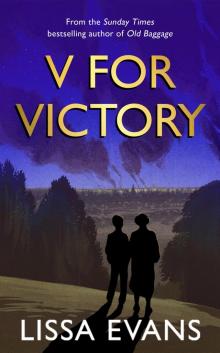 V for Victory
V for Victory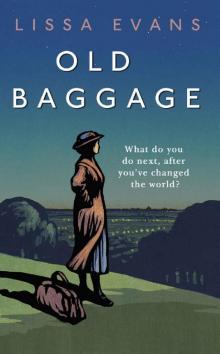 Old Baggage
Old Baggage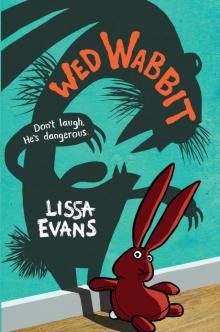 Wed Wabbit
Wed Wabbit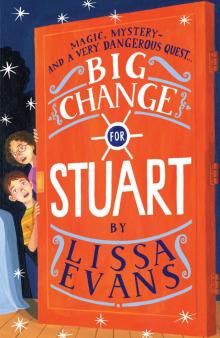 Big Change for Stuart
Big Change for Stuart Spencer's List
Spencer's List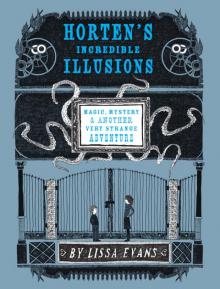 Horten's Incredible Illusions
Horten's Incredible Illusions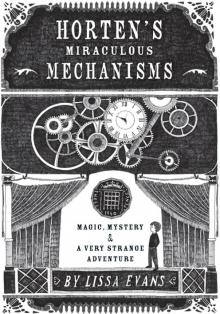 Horten's Miraculous Mechanisms
Horten's Miraculous Mechanisms Their Finest Hour and a Half
Their Finest Hour and a Half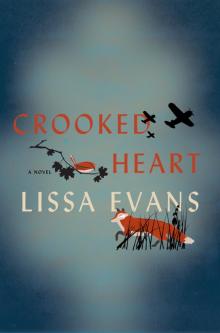 Crooked Heart
Crooked Heart